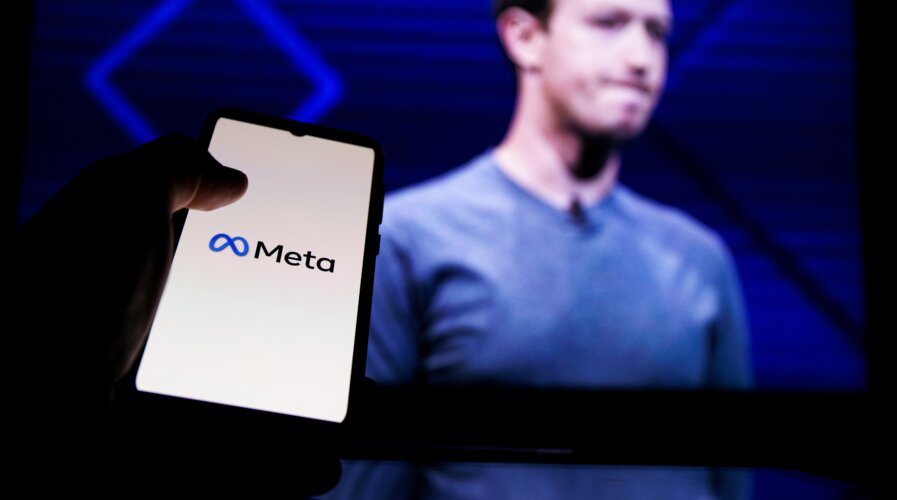
Shaping the future: How Meta’s new AI chatbot is tailored for younger users. (Source – Shutterstock)
Meta’s new AI chatbot is built with Gen Z in mind
- Meta’s AI is set to unveil “Gen AI Personas,” a new generative AI chatbot targeting younger users.
- Meta’s AI chatbot is designed with multiple personas, promises to enhance user engagement and broaden AI interaction.
As the era of artificial intelligence (AI) unfolds, the spotlight is on its influence and application for younger users. The terrain of generative AI, burgeoning with potential, stands poised to revolutionize children’s interaction with technology. It promises a world where AI can serve as a companion, educator, and facilitator, aiding in academic queries, offering insights into various subjects, and even helping nurture emotional intelligence.
However, amidst this panorama of promise, the shadows of uncertainty, potential misuse, and uncharted psychological impact on young, impressionable minds loom.
In the midst of this evolving scenario, tech giant Meta is on the brink of unveiling a groundbreaking generative AI chatbot, internally termed “Gen AI Personas.” Set to make its debut at the upcoming Meta Connect event, this chatbot, as reported by The Wall Street Journal, is designed with multiple “personas” to captivate young minds with vibrant, engaging, and relatable behavior, building upon the surging popularity of platforms like ChatGPT. Prior tests of similar Meta chatbot personas on platforms like Instagram underscore the company’s commitment to refining and expanding AI interactions for a diverse audience.
In the Instagram scenario, chatbots were said to be capable of answering questions, giving advice, and assisting users in crafting messages. Users could choose from “30 AI personalities,” finding the one that suits their preferences best.
Meta’s AI “Gen AI Personas”: A new era of engagement
Internal conversations accessed by the Journal reveal that Meta has experimented with distinct chatbot personas. These include a “sassy robot” inspired by Bender from Futurama and an overly inquisitive “Alvin the Alien.” Concerns were raised that Alvin could be perceived as collecting personal information. A specific instance of a chatbot making an inappropriate remark to a Meta employee emphasized the potential problems and highlighted the difficulty in creating AI personas that are both engaging and ethically responsible.
As indicated by the Journal, Meta’s ambition extends to the creation of several such bots. Beyond just interactive bots, the company has initiated work on a tool allowing celebrities to craft their personalized chatbots for fan engagement. Anticipation also surrounds bots focused on enhancing productivity, including assistance in coding and other significant tasks.

This X user believes AI chatbots are the future of social media. (Source – X)
Beyond these initiatives, Meta is reportedly working on a robust large language model to rival OpenAI’s GPT-4. Further, an AI model exclusively designed to augment the mobility of Horizon Worlds avatars is in development. The upcoming Meta Connect event promises insights into the company’s extensive metaverse project and the unveiling of the new Quest 3 headset.
Despite her skepticism about chatbots resonating with Gen Z, Meghana Dhar, a former executive at Snap and Instagram, acknowledged their comfort with new technologies. She emphasized that Meta’s continuous objective, consistent with all its latest products, revolves around sustaining user engagement. This prolonged interaction amplifies ad presentation opportunities, aligning with the company’s broader business strategy.
This move was announced about a month ago, highlighting the company’s purpose to provide a new search function, offer recommendations, and present a fun product for users. As reported by the Financial Times, the move comes as the US$800 billion company seeks to attract and retain users. At the same time, it battles competition from social media upstarts such as TikTok, and attempts to seize upon the widespread hype in Silicon Valley around AI since Microsoft-backed OpenAI launched ChatGPT in November.
In addition to enhancing engagement, chatbots have the potential to amass a substantial amount of new data on users’ interests, experts note. This influx of information could enable Meta to tailor content and advertisements to users more precisely. A significant portion of Meta’s annual revenue, which totals US$117 billion, is generated from advertising.
Other players in the field
However, Meta is not alone in providing generative AI chatbots for a younger audience. According to Lifewire, PinwheelGPT is designed for children aged 7 to 12 and aims to provide simple, age-appropriate answers without explicit content, links, or images. The software also allows parents to remotely access and review their child’s chats, including deleted ones, enabling insight into their child’s curiosities and offering clarifications or corrections when needed.
However, even with parental monitoring, experts express concerns about children using generative AI, highlighting issues like potential exposure to mature or violent content.
Despite assurances of security and encryption, applications like ChatGPT continue to present significant risks, such as phishing and identity theft, with Italy being the first Western country to ban it due to these concerns.
ChatGPT, while encrypting text data, presents potential vulnerabilities due to its conversational, human-like features, making it a target for hacking and phishing attempts. This application’s ability to generate more convincing spam bots and emails may make it easier for people — especially children — to be tricked into clicking links or giving away information.
The unveiling of “Gen AI Personas” and PinwheelGPT heralds not just technological advancement but underscores the vital need for a conscientious, informed, and balanced approach to AI’s role in the formative years of young individuals.
READ MORE
- 3 Steps to Successfully Automate Copilot for Microsoft 365 Implementation
- Trustworthy AI – the Promise of Enterprise-Friendly Generative Machine Learning with Dell and NVIDIA
- Strategies for Democratizing GenAI
- The criticality of endpoint management in cybersecurity and operations
- Ethical AI: The renewed importance of safeguarding data and customer privacy in Generative AI applications


